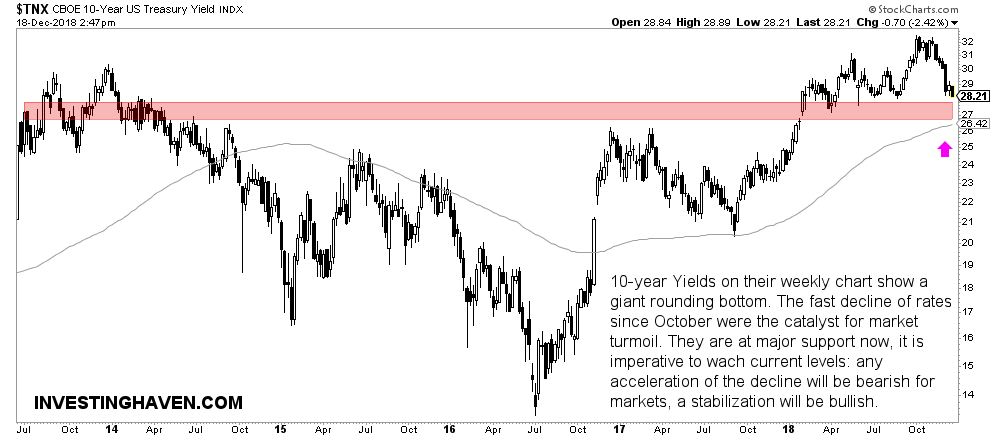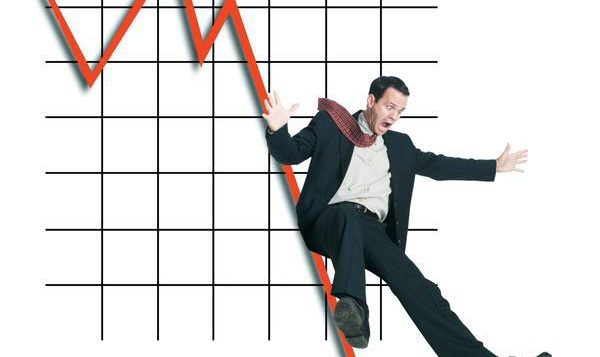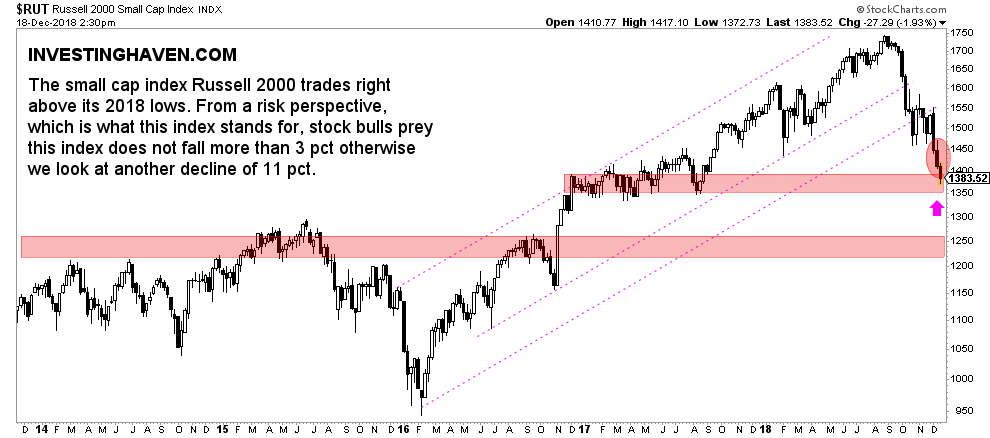As many start fearing a global market crash in 2019 is underway we tend to stay calm and focused on leading indicators. No matter how scary things may look it is imperative to remain factual. After the long term picture we showed in the NYSE Composite Index 50 year long term chart we now turn our attention to the medium term timeframe. In this article we feature 2 leading indicators for market turmoil, and, as expected, they both are near critical levels.
Look at the news headlines of the last hour it would make you run to the hills. This is just a short overview of what the keyword ‘markets‘ returns on the internet:
Growth fears drive FTSE 100 to two-year closing low (The Guardian)
Alan Greenspan has a new warning for investors: ‘Run for cover’ (CNBC)
Volatile markets and a volatile president — What to know ahead of the Fed’s final meeting of 2018 (Yahoo! Finance)
Credit markets signal recession in early 2019 as central banks keep tightening (Telegraph)
How the smart money is reading the Fed’s tea leaves (CNN)
Oil nosedives to $46. Worries about economy collide with supply glut (CNN)
There is lots of emotions involved in this. And, in the end, one can endlessly look at data points, and always find a bull case and a bear case.
What we tend to do at InvestingHaven is identify a small number of really leading indicators so we can remain factual.
Our 2 Leading Indicators At Critical Levels
The first leading indicator is small caps represented by the Russell 2000.
In the big picture we said that U.S. small cap stocks have a track record of signaling major tops and bottoms. For instance, the 2009 bottom came in right at the 2002 lows, so it was a great leading indicator.
Based on the long term chart we observed that U.S. small cap index have some 10 pct downside. We expect the 2014-2015 highs to provide sufficient support.
If we zoom in and look at the weekly chart on 5 years we see a somehow similar picture.
The small cap index which we consider a gauge for risk in risk assets (like stock markets) is right now at a major support level. It has some 3 pct downside. If this support gives way it will open the door for more downside more specifically another 11 pct. The latter is the same level we observed on the long term chart.
Monthly and weekly are nicely in synch.
The second leading indicator is 10-year yields.
It has a track record of signaling major tops and bottoms primarily in U.S. stock markets one or two months before they happen.
On its 50 year chart we saw a potentially very disruptive event: 10-year Yields tried to break out from a falling trend that started 4 decades ago but fell back in their long term channel very recently. This breakout attempt started in August of this year, and we reported on this in great detail in Major Turning Point: End Of 40-Year Bull Market In Bonds. The breakout lasted for 3 months after which, a couple of weeks ago, Yields fell back in their channel. This may become a failed breakout, and, if so, will have a similar looking as the failed breakout of 2007.
On the weekly chart on 5 years shown below we see that 10-year Yields are near a major support area.
The weekly chart shows this giant rounding bottom. Most likely the fast decline of rates since October was the catalyst of market turmoil.
Let’s get things straight: if 10-year Yields continue to fall below 2.60 markets might be in trouble. An acceleration of the the decline, certainly below 2.60 will be the ultimate trigger for a global market crash of 2019.
Any stabilization above current levels will be bullish (neutral at worst) for markets.

TOP CRYPTOCURRENCIES TO BUY: Which top crypto tips are flashing a BUY signal now? Which to avoid? Top notch guidance on how to play the grand bull market in crypto from InvestingHaven’s research team, only for $2 per week. Crypto & Blockchain investing service >>








